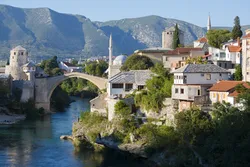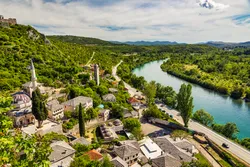See all articles relating to: Bosnia and Herzegovina

Bosnia and Herzegovina is a country situated in Southeast Europe on the Balkan Peninsula. Historically, the region has been a melting pot of various cultures and religions which shaped its unique identity. It was conquered by the Ottoman Empire in the 15th century, which left a lasting Islamic influence, and later fell under Austro-Hungarian rule in the 19th century. The assassination of Archduke Franz Ferdinand in Sarajevo in 1914 by Gavrilo Princip, a member of the Bosnian Serb nationalist movement, sparked the beginning of World War I. Following the war, Bosnia and Herzegovina became part of the Kingdom of Serbs, Croats, and Slovenes, which eventually became the Socialist Federal Republic of Yugoslavia. The dissolution of Yugoslavia in the 1990s led to the devastating Bosnian War (1992-1995), which was marked by the involvement of important figures such as Alija Izetbegović, the first president of the independent Bosnia and Herzegovina, and Radovan Karadžić, the leader of the Bosnian Serb nationalists.
Research your ancestors on MyHeritage
Researching family history in Bosnia and HerzegovinaResearching family history in Bosnia and Herzegovina
Key records available for genealogical research in Bosnia and Herzegovina include vital records (birth, marriage, and death certificates), which are typically maintained by local civil registration offices or religious institutions. In addition, church records such as baptismal, marriage, and burial registers can offer valuable insight into family connections, as Bosnia and Herzegovina has a long-standing tradition of religious observance. Census records, when available, can provide a snapshot of family composition and socioeconomic status during specific time periods. Military records, particularly from the era of the Ottoman Empire and the Balkan Wars, can reveal information about male ancestors' service history. Finally, notarial records, which document legal transactions like property sales and inheritance, can also shed light on family relationships and assets.
See also:
Bosnia and Herzegovina ethnicityBosnia and Herzegovina ethnicity
Bosnia and Herzegovina is characterized by a diverse ethnic landscape primarily comprising three main groups: Bosniaks, Serbs, and Croats, which are grouped together under Balkan ethnicity in the MyHeritage DNA results. Bosniaks, predominantly Muslim, constitute the largest ethnic group, while Serbs, who mainly adhere to Orthodox Christianity, and Croats, who are predominantly Roman Catholic, follow closely.
See also:
Bosnia and Herzegovina surnamesBosnia and Herzegovina surnames

Many Montenegrin surnames end in the suffix "-vić," denoting a patronymic relationship, while others might indicate an individual's place of origin or occupation. By studying the patterns and meanings behind Montenegrin surnames, researchers can unlock important clues to their family's past and enhance their genealogical investigations.

